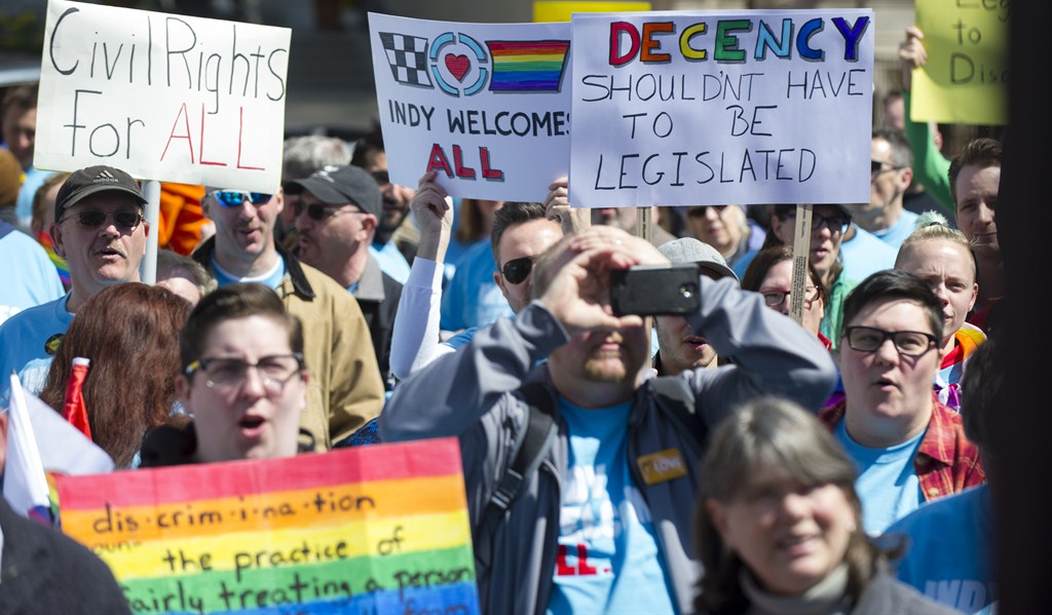Louisiana Governor Bobby Jindal used his appearance on Meet the Press this week to frame the roiling, and often ignorant, religious liberties debate in a savvy and sensible manner. Jindal rejected discrimination against gay people, focusing on the very narrow (and
Advertisement
TODD: Well, let me ask you this. Do you agree with some other social conservatives that you think Governors Pence and Governor Hutchinson of Arkansas and Indiana have essentially caved to too much pressure?
JINDAL: Well, Chuck, I was very worried about the law in Indiana. I’m disappointed. Let’s remember what this debate was originally all about. This is about business owners that don’t wanna have to choose between their Christian faith, their sincerely held religious beliefs, and being able to operate their businesses. Now, what they don’t want is the government to force them to participate in wedding ceremonies that contradict their beliefs. They simply want the right to say, “We don’t wanna be forced to participate in those ceremonies.” So I was disappointed that you could see Christians and their businesses face discrimination in Indiana. I hope the legislators will fix that, rectify that. Chuck, there used to be a bipartisan consensus in this country around religious liberty saying that as Americans we don’t all have to agree with each other, but we should respect each other’s rights and freedoms. And that’s what this debate is about. Are we gonna use government to force people to contradict their own sincerely held beliefs.
TODD: Well, the debate, I guess, is about the line on freedom and a personal conviction versus how you conduct yourself in a business. So you think it’s okay based on religious conviction for a business to deny services to a same-sex couple?
JINDAL: Well, Chuck, we’re not talking’ about restaurants denying service to people who wanna come and have dinner. We’re not talking about day-to-day routine commercial transactions. We’re talking about a very specific example here of business owners, of florists, of musicians, of caterers who are being forced to either pay thousands of dollars or close their businesses if they don’t wanna participate in a wedding ceremony that contradicts their religious beliefs. So in that instance, yeah, I think part of the First Amendment means that we allow individuals to obey their conscience, to obey their religious beliefs.
Recommended
Advertisement
Jindal tries to shift his attention to "what this debate was originally about," but it's quite important to underscore that laws like Indiana's RFRA have been used to protect the rights of religious minorities (Muslims, Jews, Sikhs, Native Americans, etc.) within cases that have nothing whatsoever to do with gay rights. As far as that issue is concerned, however, Jindal is correct to shut down talk of blanket denial-of-service "liberties" and bear down on the discrete wedding participation issue. RFRAs do not establish an affirmative license for discriminatory practices, as ill-informed or dishonest demagogues have recently suggested; they merely afford targets of lawsuits and government sanctions to invoke religious liberties in self-defense, with no guarantee of prevailing in court. Raising a RFRA defense merely requires that a stricter set of balancing tests be applied to the facts of the case prior to a decision being rendered. As Gabriel Malor noted last week, not a single RFRA defense in gay rights-related legal dispute has ever succeeded. This suggests that perhaps more explicit "wedding participation carve-out" legislation might be in order, especially if the Supreme Court establishes same-sex marriage as a Constitutionally protected right later this spring. Such a modest accommodation for a specific and small band of businesses' conscience rights, in the face of a massive social sea change, would be entirely appropriate. It would also help foster a society in which tolerance is a two-way street, and coexistence is a reality, not an unevenly-applied slogan.
Advertisement
By the way, Arkansas Governor Asa Hutchinson appears to have played his cards well in this whole episode. Part of the reason Indiana's law faced such intense heat was that it slightly expanded the verbiage of the federal RFRA to explicitly incorporate several precedents established by the courts -- namely, that businesses have conscience rights, and that RFRA defenses can be mounted in private lawsuits. With an eye on the Hoosier State firestorm, Hutchinson requested that his legislature alter its legislative language to exactly mirror the federal text, which President Clinton signed, and a version of which Barack Obama supported in Illinois. The legislature in Little Rock complied, and their bill is now law. By going this route, Hutchinson defused critics' hysteria, and allowed supporters to make the clean political point about Clinton and Obama, without any caveats. Arkansans are now covered by RFRA's protections, and the aforementioned precedents can speak for themselves in court, if necessary. By contrast, Indiana's amended law actually makes it harder for, say, a Muslim florist to raise a RFRA defense if she's sued for asking not to service a same-sex wedding in the state. These complications are why I'm increasingly convinced that reasonable supporters of gay rights should favor a system of legal civil marriage and robust anti-discrimination laws -- with clear, wide-ranging exemptions for religious institutions (churches, religious schools, etc), along with limited, carefully-tailored exemptions for private businesses exclusively within the realm of wedding participation.
Advertisement

























Join the conversation as a VIP Member